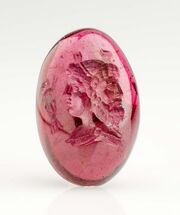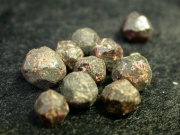Almandine
Jump to navigation
Jump to search
Description
A red Garnet composed of iron aluminum silicate. Almandine can range in color from pale violet to bright red to purplish to brownish black. It was popular as a gem in Roman times and was also commonly found in Egypt. Gemstone quality almandine is mined in Asia Minor, Sri Lanka, Australia, Alaska, Africa, Norway, Sweden, and Japan. It is frequently cut en cabochon then called carbuncle.
Synonyms and Related Terms
almandite; carbuncle; garnet; Ceylon ruby; Syrian garnet; Australian ruby; alabandicus (Pliny); Almandine (Deut.); almandino (Esp.); almandyn (Pol.); almandina (Port.); almandien (Ned.)
Physical and Chemical Properties
- Fracture = conchoidal.
- Luster = vitreous to resinous.
- Streak = colorless.
- Birefringence = none.
- Pleochroism = none.
- UV fluorescence = inert
| Composition | Fe3Al2Si3O12 |
|---|---|
| Mohs Hardness | 7.0-7.5 |
| Density | 4.05 - 4.3 g/ml |
| Refractive Index | 1.79-1.83 |
| Dispersion | 0.024 |
Comparisons
Resources and Citations
- Gem Identification Lab Manual, Gemological Institute of America, 2016.
- Mineralogy Database: Almandine
- G.S.Brady, Materials Handbook, McGraw-Hill Book Co., New York, 1971 Comment: p. 752
- Encyclopedia Britannica, http://www.britannica.com Comment: 'almandine" [Accessed May 8, 2003]
- C.W.Chesterman, K.E.Lowe, Audubon Society Field Guide to North American Rocks and Minerals, Alfred A. Knopf, New York, 1979
- Sue Fuller, Rocks and Minerals, DK Publishing, Inc., New York City, 1995
- Jack Odgen, Jewellery of the Ancient World, Rizzoli International Publications Inc., New York City, 1982
- Wikipedia: http://en.wikipedia.org/wiki/Almandine (accessed June 2004)



